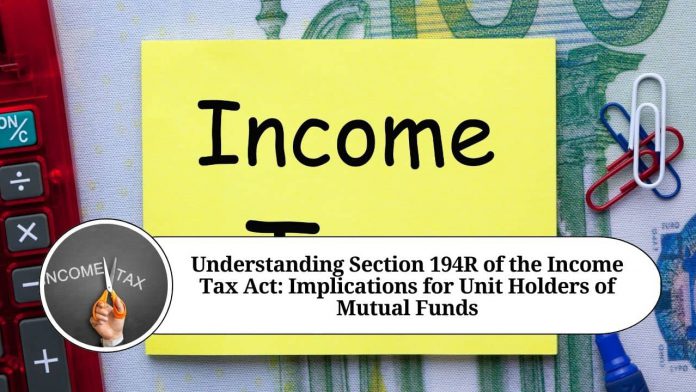Section 194R of the Income Tax Act was introduced in the Union Budget 2020 and has implications for unit holders of mutual funds. This section deals with the taxation of income distributed by mutual funds to unit holders, and investors need to understand its provisions and implications. This article will provide an overview of Section 194R and explain its key provisions and implications for unit holders of mutual funds.
Introduction to Section 194R
Section 194R of the Income Tax Act was introduced to tax the income distributed by mutual funds to unit holders. This section was inserted by the Finance Act, of 2020, and it became effective on April 1, 2020. The section imposes a tax deduction at source (TDS) on the income distributed by mutual funds to unit holders. The TDS rate is set at 10% of the income distribution, and it applies to resident individuals, Hindu Undivided Families (HUFs), and firms.
Key Provisions of Section 194R
The following are the key provisions of Section 194R of the Income Tax Act:
- Applicability: Section 194R applies to resident individuals, HUFs, and firms. Non-resident individuals and foreign entities are exempt from this section.
- Income Distribution by Mutual Funds: The section applies to income distribution by mutual funds to unit holders. The income may be in the form of dividends, interest, or any other payment made by the mutual fund.
- TDS Rate: The TDS rate under Section 194R is 10% of the income distributed by the mutual fund to the unit holder.
- Threshold Limit: Section 194R provides for a threshold limit of Rs. 5,000. If the income distributed by the mutual fund to a unit holder is less than Rs. 5,000 in a financial year, no TDS will be deducted.
- Exemption for Certain Mutual Funds: Section 194R provides an exemption for certain mutual funds. This exemption applies to mutual funds that are set up under a specified scheme of the government and invest primarily in specified securities.
Implications of Section 194R for Unit Holders of Mutual Funds
The introduction of Section 194R has several implications for unit holders of mutual funds. The following are the key implications of this section:
- TDS Deduction: Section 194R mandates the deduction of TDS at the rate of 10% on the income distributed by mutual funds to unit holders. This means that the income received by the unit holder will be lower than the amount of TDS deducted.
- Tax Liability: The TDS deducted under Section 194R is only an interim tax liability. Unitholders of mutual funds will need to include the income received from mutual funds in their total income for the financial year and pay tax accordingly. The TDS deducted will be adjusted against the final tax liability.
- Impact on Returns: The TDS deduction under Section 194R can have an impact on the returns earned by unit holders of mutual funds. If the TDS rate is higher than the tax liability of the unit holder, it can result in a lower return on investment.
- Exemption for Certain Mutual Funds: Section 194R provides an exemption for certain mutual funds. This exemption applies to mutual funds that are set up under a specified scheme of the government and invest primarily in specified securities. This means that unit holders of such mutual funds will not be subject to TDS under Section 194R.
Conclusion
Section 194R of the Income Tax Act has significant implications for unit holders of mutual funds. It imposes a TDS on the income distributed by mutual funds to unit holders, which can impact the returns earned by investors.
Unitholders will also need to include the income received from mutual funds in their total income and pay tax accordingly. However, the exemption for certain mutual funds provides relief for unit holders who invest in these funds.
Read Other Useful Blogs:
Frequently Asked Questions:
Q: What is Section 194R of the Income Tax Act?
A: Section 194R is a provision in the Income Tax Act that governs the tax implications for unit holders of mutual funds.
Q: To who does Section 194R apply?
A: Section 194R applies to individuals, Hindu Undivided Families (HUFs), and other resident taxpayers who are unit holders of mutual funds.
Q: What are the implications of Section 194R for unit holders of mutual funds?
A: Section 194R requires mutual funds to deduct tax at source (TDS) at the rate of 10% on the income earned by unit holders through the redemption or sale of mutual fund units.
Q: What income is subject to TDS under Section 194R?
A: TDS is applicable on income earned by unit holders through the redemption or sale of mutual fund units. This includes long-term capital gains, short-term capital gains, and dividend income.
Q: Is TDS applicable to all mutual fund schemes?
A: No, TDS applies only to specified mutual fund schemes. As per the Income Tax Act, specified mutual fund schemes include equity-oriented funds, balanced funds, and mutual funds that invest primarily in debt-oriented instruments.
Q: Can unit holders claim a refund of the TDS deducted under Section 194R?
A: Yes, unit holders can claim a refund of the TDS deducted under Section 194R while filing their income tax returns if their total income is below the taxable limit.
Q: Is there any threshold limit for TDS under Section 194R?
A: Yes, TDS under Section 194R is applicable only if the income earned by the unit holder through the sale or redemption of mutual fund units exceeds INR 5,000 in a financial year.
Q: Are non-resident unit holders of mutual funds covered under Section 194R?
A: No, Section 194R applies only to resident unit holders of mutual funds. Non-resident unit holders are subject to a different set of tax rules.
Q: When did Section 194R come into effect?
A: Section 194R was introduced in the Finance Act, 2020, and came into effect on 1st April 2020.




















